|
Anyone who’s watched a few American noir thrillers will be used to seeing characters within them double-crossed or misled, but few films I can readily recall have the confidence to show two of its principal characters being royally hoodwinked in its first 15 minutes. It shouldn’t really work, as theoretically we haven’t been given enough time to build up a rapport with either the victims or the instigators by this point and thus can’t be expected to have an emotional response to either. Yet that’s exactly what I experienced during the opening scenes of the 1942 crime thriller This Gun for Hire. The first saw me do an about-turn on how I felt about the target and take an instant dislike to the perpetrator, while the second, well, that just caught me by surprise. By this point the film had me firmly in its grip, and as I was soon to discover, it was a grip it had no plans to loosen during the course of the remaining 65 minutes of tightly plotted screen time. If you want to be surprised by both of these early twists, then I’d skip to the end of this review and avoid all plot summaries elsewhere, as they’re an integral part of the setup and not something you can subtly dance around if you’re going to tell your readers what the film is about. If you are planning to read on get yourself comfortable, as there’s a lot to get youre head around in the first half-hour.
The film opens in arresting fashion, as a man named Philip Raven (Alan Ladd) wakes up in his small San Francisco boarding house room, checks the time and location of a meeting, puts a loaded gun in a satchel and quickly readies to leave. Just when we’ve got him pegged as a hard man he pauses to let in and feed a cat that is loitering outside of his window. Any suggestion that this might be a sign that he is really a decent guy just looking to protect himself is then given a sharp kick in the nuts when hotel employee Annie (Pamela Blake) arrives to clean his room and angrily attempts to shoo the cat away, which prompts Raven to appear from the bathroom, pull her round so hard that it tears her dress, slap her across the face and send her on her way.
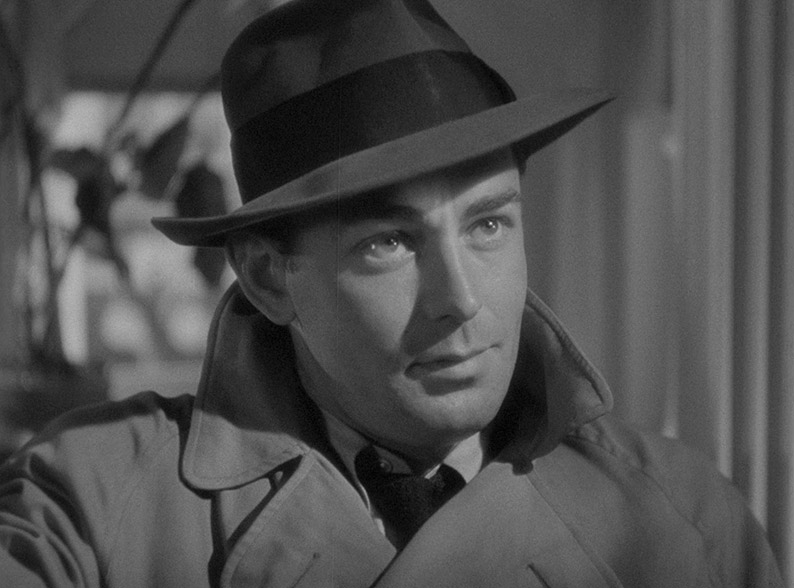
When he arrives at the specified location the door in answered by a man named Albert Baker (Frank Ferguson), whom it quickly emerges is blackmailing someone who has employed Raven to deliver the demanded payment. But Raven’s not a bagman, he’s an assassin, and when Baker holds up the incriminating letter and asks for for the money, Raven pulls out his gun and shoots him dead. He then turns the gun on Baker’s female companion with the stonily delivered line, “They said he’d be alone,” then kills her too. On his way out of the apartment block, a small handicapped child he passed on the way in is still sitting on the stairs and asks him to pass her dropped ball to her. For a terrifying couple of seconds, Raven reaches for the satchel in which he keeps his gun, then pauses and hands the ball over instead. Clearly this guy is not to be messed with, which makes what happens next seem all the more foolhardy.
The cash-strapped Raven then meets up with Willard Gates (Laird Cregar), who employed him on behalf of an unidentified client, and is immediately suspicious when he’s paid in $10 notes, which I can presume was the equivalent of being paid in $100 bills today. He makes it clear to Gates what he would do to anybody who crossed him, using a sharp, stabby knife as a visual aid, which also handily establishes it’s existence for when it comes in useful later. In the very next scene (transitioned to via a lovely movement continuity edit) Gates is at police headquarters in his daytime role as an executive of the Los Angeles-based Nitro Chemical Corporation demanding to know what is being done about money that was stolen from the company paymaster. And wouldn’t you know it, the dosh in question was all in $10 notes, notes whose serial numbers will allow the cops to nab the thief as soon as a he spends one of them assures Detective Michael Crane (Robert Preston), who was on holiday away from his home base in Los Angeles until seconded to take charge of the case. Gates is even offering a reward for the man’s apprehension, though appears to prefer that he be shot on sight. Despite Raven’s earlier behaviour I quickly found myself rooting for him against this duplicitous git.
It turns out that as well as his executive role, Gates owns a Los Angeles nightclub and has been persuaded by dourly cynical talent spotter Blair Fletcher (a dryly funny Olin Howlin) to take a look at singer Ellen Graham (Veronica Lake) with a view to hiring her to perform at his venue. Her performance is unexpectedly captivating, less for the period-generic song than for the conjuring tricks she fluidly performs while she is singing. Today you can guarantee this would all be CGI, but I have to presume that Lake trained for some time to pull them all off for real with such casual aplomb (I only spotted a single quick optical dissolve). Gates is as struck by her beauty as he is by her act and promptly agrees to hire her, but as soon as he departs we discover the whole thing was a ruse to get him to do just that as part of some as-yet unspecified plot. A short while later Ellen has a secret meeting with a government official named Senator Burnett (Roger Imhoff), who reveals that they suspect Gates of meeting with enemy agents, and that they’d like her to take the proffered nightclub job and see if she can find evidence of his wrongdoing, something she patriotically agrees to do. Complex enough? Well, buckle up, we’re just getting started.
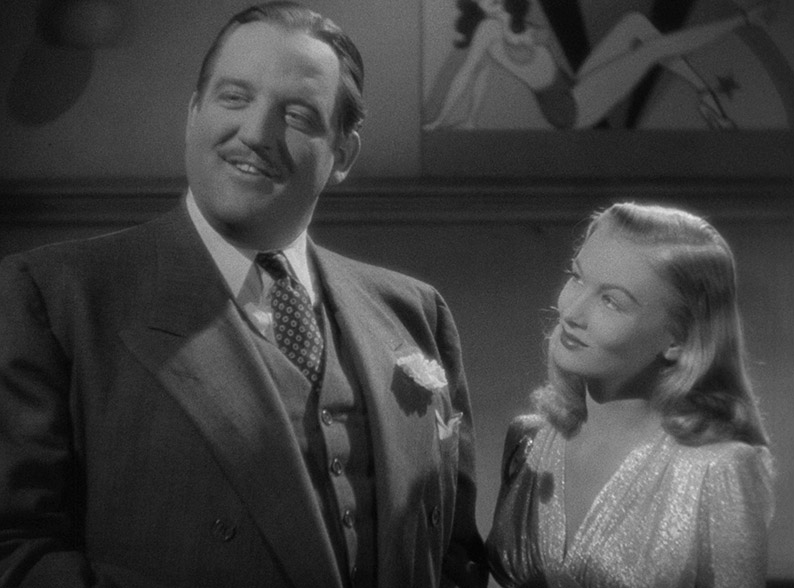
That evening Ellen meets up with her boyfriend and would you believe it, he’s the very same Detective Michael Crane that Grant was demanding action from earlier. Good news, he tells her, thanks to this robbery case he won’t be going back to Los Angeles just yet, which kind of rains on Ellen’s news that she’ll be heading there tonight for an extended period. These two clearly can’t get a break. Raven, meanwhile, makes nominal amends for tearing Annie’s dress by stopping by a shop and paying for a new one with one of the $10 notes given to him by Gates. The discovery that this note is one of the ones from the paymaster robbery sends Crane and uniformed sergeant to Raven’s boarding house, but when Raven overhears them talking to the manager (Chester Clute) he quietly outwits them and makes his escape. Later, when Grant boards a train to head back to Los Angeles he is followed by Raven, who also boards the train, and in an unlikely twist that nonetheless works perfectly for the story, the only free seat turns out to be right next to Ellen, who is on her way to Los Angeles to take up her new post.
One of the most most seductive aspects of this busy scene-setting is how smoothly and efficiently the threads that connect the principal characters are drawn, like strands of a web that has Gates at its centre. He initially appears to be the ringmaster here, hiring Raven to dispose of a problematic blackmailer, Ellen to bring customers into his nightclub, and Crane – via the detective’s duties as a law enforcement official – to unknowingly dispose of the only person who could tie him him to the blackmailer’s murder. Yet soon the tables are turned and he has become the target of an official investigation by Senator Burnett through Ellen, and has been marked for death by a vengeful Raven. Thus when Raven and Ellen sit together on the train, they are both unknowingly drawn to Los Angeles by the same man but for conflicting reasons, with Ellen’s set task to uncover information on Gates put at serious risk by Raven’s intention to kill him and his mysterious employer as payback for setting him up.
Even by early noir standards, Raven is risky character to ask an audience to sympathise with, given that he’s painted from the start as a cold and ruthless killer who thinks nothing of slapping a woman in the face and murdering another. Indeed, I initially wondered if my early engagement with him was shaped less by how he is portrayed here than the many cinematic antiheroes that followed in his wake. Indeed, it seems almost certain that Raven was a direct influence on Alain Delon’s cool-as-ice hit man in Jean-Pierre Melville’s Le Samouraï – I have a sneaking suspicion they even visited the same tailor. Yet the film opens on Raven in a manner that suggests that it’s his story that will drive the narrative, and by the end it becomes clear that he’s not the natural born killer we initially take him for but a man who has been negatively shaped by the cruelty of others. His disdain for people and relationships is neatly captured during his early conversation with Gates, who offers him two show tickets in addition to his payment and suggests he take his girl, adding, “You must have a girl…or a friend…” to which Raven coldly responds, “Why?” Yet his affection for cats reveals a very different side to his personality, his professed admiration for their independent nature having the feel of a justification for actually liking them so much more than he likes people.
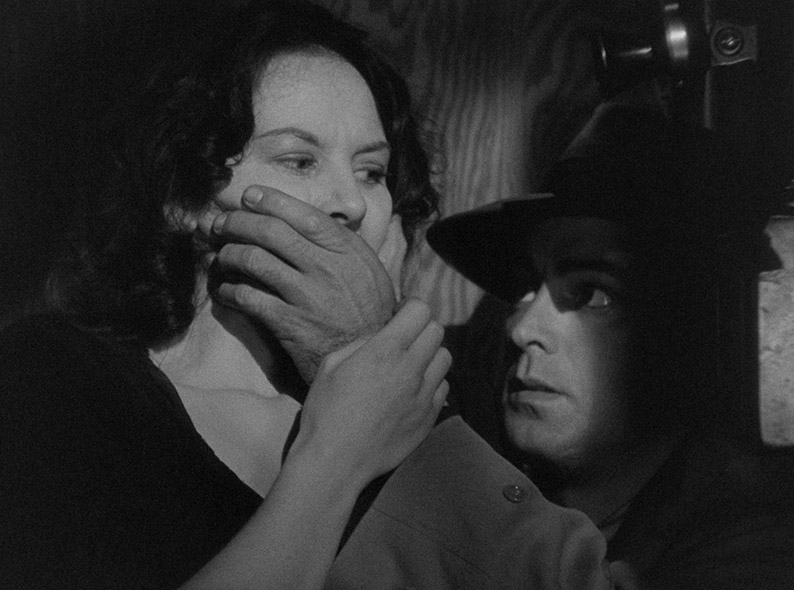
Of course, a key reason Raven is such a compelling screen presence is very much down to Alan Ladd’s deliciously hard-boiled performance. Ladd had done film work before This Gun for Hire, but the fact that his character is so central to the story and that he is announced with the credit “introducing Alan Ladd” suggests the filmmakers knew exactly what had landed in their laps and what the impact of his performance was likely to be. Technically, Veronica Lake and Robert Preston are the stars, but this is without doubt Ladd’s movie and the one that very effectively propelled him to stardom. That’s not to take anything away from the other members of a very fine cast, each of whom is on fine form here, but Ladd quietly steals every scene he is in, and in a way that never detracts from the story.
The screenplay by respected writers Albert Maltz and W.R. Burnett was adapted from the novel A Gun for Sale by none other than Graham Greene, and despite making a few significant changes to the source, they have fashioned a tight, multi-stranded intermittently suspenseful work that has its share of memorable exchanges and set-pieces. Perhaps the best of these occurs when the police come looking for Raven at his boarding house and he sneaks into a phone booth which the unknowing Annie then enters, then is held at gunpoint and prompted to fake a conversation with the manager’s wife to reveal pertinent information to Raven. Director Frank Tuttle – who later gave up names to the House of Un-American Activities Committee and in doing so contributed to the blacklisting of one this film’s screenwriters, Albert Maltz – responds to his material with an efficiency that showcases the story and performances without ever drawing attention to the handling. It’s a task in which he is aided immeasurably by Double Indemnity and The Lost Weekend cinematographer John F. Seitz’s moody lighting camerawork and a sometimes arresting use of actual locations.
This Gun for Hire is regarded as one of the pioneering works of American film noir and that reputation is well earned. Ladd’s portrayal of Raven draws up a template for emotionally cold criminals and killers for years to come, from Delon in Le Samouraï to Ryan O’Neal in Walter Hill’s The Driver, while his solitary life and affection for cats have later echoes in the title character of Luc Besson’s Leon and his beloved pot plant. He is the new star here, around which this smartly structured, consistently gripping and splendidly cast and acted crime drama revolves, with all the elements coalescing over the course of 81 waste-free minutes into a memorable and immensely satisfying whole.
The 1.37:1 1080p transfer on this Blu-ray has been sourced from what the press release describes as “a 4K scan from the original film elements.” Note the plural there. I’m guessing more that one source was used for the restoration, which would account for some visible variation in the quality and condition of the image and the presence of some reel change markers, something you only find on projection prints. The good news is that the best material – and there’s a lot of that – is in excellent shape, with crisp picture detail, well-balanced contrast and only the faint traces of any brightness flicker. When the quality does slip it’s usually not by much and is visible either in a slightly washed-out contrast (and I do mean slightly), a marginal softening of sharpness, a tiny degree of picture jitter or a combination of the three. Just occasionally a shot will display some minor damage or scratches. For the most part, however, it looks damned fine.
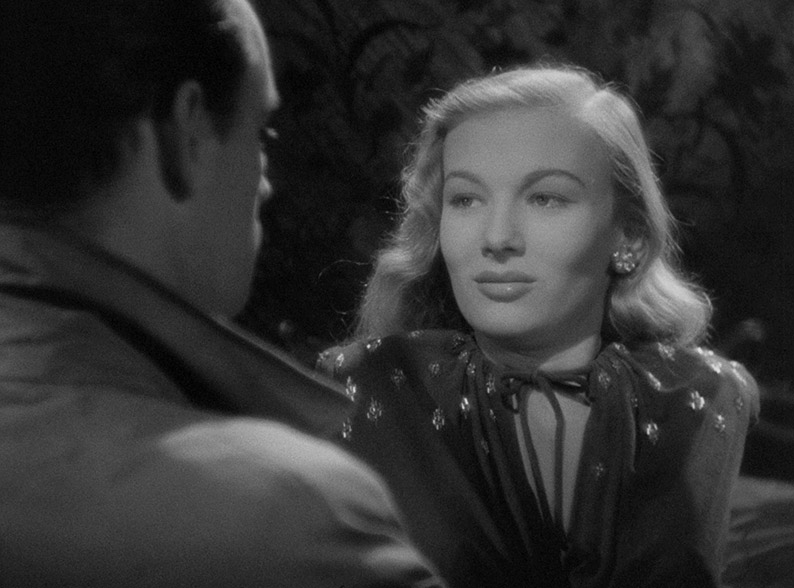
The Linear PCM 2.0 mono soundtracks shows its age but is otherwise in decent shape, with clear dialogue and effects, the expected narrowing of the dynamic range, and a faint background hiss that is never intrusive.
Optional English subtitles for the hearing impaired are available.
Audio Commentary by Adrian Martin
A commentary by Australian film scholar Adrian Martin is always a welcome addition to any disc, and this one is up to his usual standard. He kicks off with an interesting deconstruction of how the film title differs from that of the British title of Greene’s source novel and gives a welcome level of coverage to the differences between the book and the film. He notes the film’s influence on Le Samouraï (it would be hard to miss), talks about Greene’s work as a film critic and how his books could have a cinematic structure, and also provides details of how the nefarious work of the House of Un-American Activities Committee negatively impacted on some of those involved in the production. There’s plenty more here to be enthralled and educated by.
Lux Radio Theatre Adaptation (59:59)
In what is becoming something of a regular special feature on Eureka discs of films from the 40s and 50s, this audio-only extra (the screen features occasionally changing posters to avoid screen burn-in) features the Lux Theatre radio adaptation of the film from January 1943 and stars Alan Ladd and Laird Cregar from the original cast, with Veronica Lake’s role played here by Joan Blondell. The story as it plays out in the film is inevitably compressed to fit into the 45 minute running time (more on that in a second) and has to convey elements audibly that played out visually on screen, but a surprising amount of the original dialogue has made it to this version without serious alteration. As ever, it still plays as This Gun for Hire light, and as ever has a couple of pauses to hawk Lux soap in a way that suggests that we should judge by appearances (please don’t). The final ten minutes is handed over to a comical performer of the time whose name I didn’t catch ands whose antics I didn’t laugh at, as well as a salute to Alan Ladd, who the very next day was off to serve in World War II.
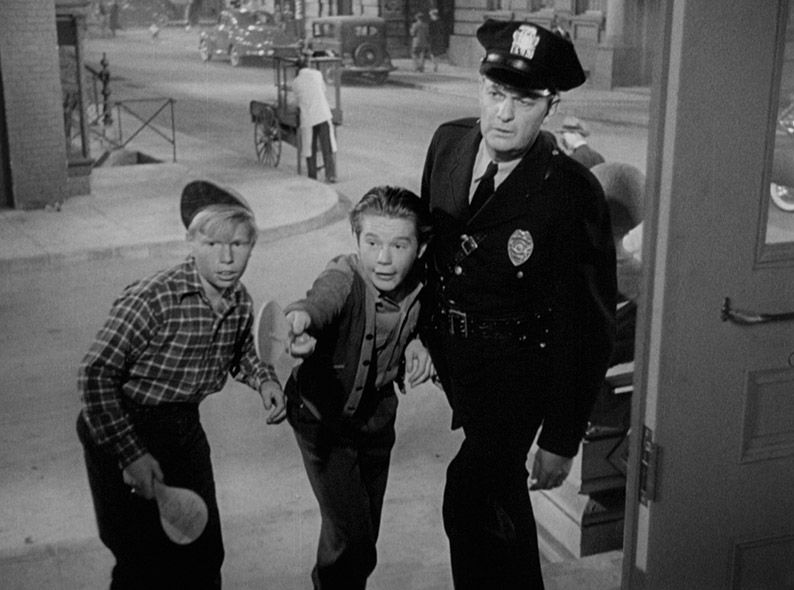
Screen Guild Theatre Radio Adaptation (28:34)
Another beauty product-sponsored radio adaptation (this time by a skin cream company known as Lady Esther), and at less than half-an-hour in length (with product-selling pauses) the story is even more radically compressed here, resulting in far more changes to the dialogue and detail than the Lux Radio Theatre version. Originally broadcast on 2 April 1945, this one has Alan Ladd and Veronica Lake recreating their screen roles, though here the story is told from Ellen’s viewpoint, kicking off with a subject scene-setting voiceover of the sort that would become something of a noir movie staple. Despite following the main story beats of the film original and featuring two of its stars, the dialogue here is not of the same calibre.
Stills Gallery
81 screens of “archive stills and promotional ephemera,” many of which are of excellent quality. There are some unsurprisingly lovely portraits of Veronica Lake, but my favourite has to be a behind-the-scenes still of her lying on a bed, smilingly conversing with a man that I presume is director Tuttle while serious-faced props men are tying her up with rope for an upcoming scene. This one’s also in the booklet, so I have a feeling I’m not its only fan.
Booklet
Leading the way here, at least after the main film credits, is a thoughtful essay on This Gun for Hireby film writer Barry Forshaw, with particular focus on director Frank Tuttle and author Graham Greene. This is followed by an equally enthralling piece by film scholar, writer and researcher Craig Ian Mann on the film and its cultural and historical context. Viewing notes, disc credits and production stills have also been included.
I’ll admit that I’m a complete sucker for classic noir and yet had somehow never seen This Gun for Hire until this disc arrived on my doormat. I enjoyed the hell out of it. Ladd’s star-making turn as Raven is a key attraction, but all of the elements gel splendidly in a film that doesn’t waste a second of its tightly packed running time. The restoration is solid, the transfer first-rate and the extras enjoyable. I’ve no complaints at all. Highly recommended.
|